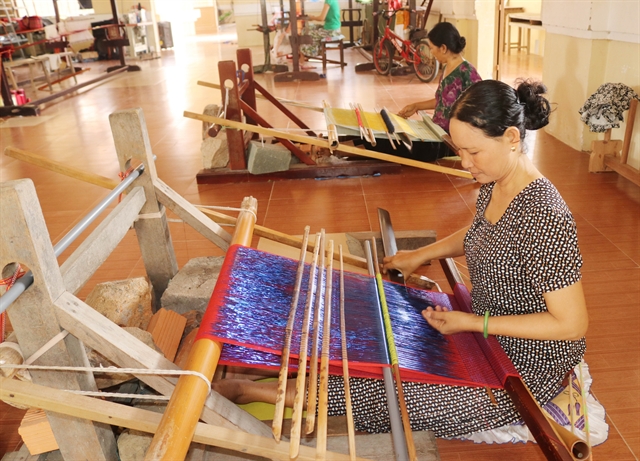 Society
Society

Less than 20 per cent of cooperatives are financially independent while access to credit and capital remains limited, accounting for under 1 per cent.

|
| Members of Ninh Thuận Province’s Mỹ Nghiệp Chăm ethnic brocade waving cooperative make traditional scarfs. — VNA/VNS Photo Nguyễn Thành |
HA NỘI — Less than 20 per cent of cooperatives are financially independent while access to credit and capital remains limited, accounting for under 1 per cent.
The issues were raised by Phạm Công Bằng, director of the Central Cooperative Assistance Development Fund, at Monday’s national conference to review the 15-year implementation of Resolution No 13-NQ / TW on the renewal, development and improvement of collective economic efficiency in the non-agricultural sector, chaired by Deputy Prime Minister Vương Đình Huệ.
According to Phan Huy Sự, director of Nhơn Trạch Transport Cooperative which has nearly 6,000 cars and some 10,000 workers, their demand for capital to pay for fuel, wages and other expenses is huge.
However, it is difficult to get access to preferential loans.
“To solve urgent needs, some members have to seek black credit and receive payday loans which negatively impact their income,” said Sự.
Acknowledging the situation, Nguyễn Kim Anh, State Bank of Việt Nam Deputy Governor, said people’s credit funds did not effectively implement lending activities and kept interest rates high, restraining their role of connecting and supporting cooperatives.
Nguyễn Văn Thịnh, deputy head of Việt Nam Cooperative Alliance, said Việt Nam had more than 64,000 non-agricultural collective groups and 23 non-agricultural cooperative alliances. Most of them are unable to get access to loans offered by commercial banks as they fail to meet terms and procedures.
Bằng stressed upon capital as the biggest obstruction to cooperatives, making it impossible for cooperatives to expand their businesses.
“Cooperatives might be exposed to the threat of bankruptcy when unable to pay back a loan. The barrier is also set for those who want to apply the latest technologies. Once the challenge remains, there will be no transition to supply chain and sustainable development,” said Bằng.
The fund has granted more than 5,700 loans for non-agricultural cooperatives with some VNĐ6 trillion (US$258 million). The average loan interest rate is 5.4 per cent.
“The Government needs to offer transport cooperatives preferential loans to ease financial burdens, promote productivity, raise incomes and help cooperatives develop sustainably,” said Sự.
Sharing the opinion, deputy transport minister Nguyễn Nhật, urged the Government to support cooperatives, especially investing in transport infrastructure.
“It is essential to upgrade and develop domestic waterway and road systems, creating a logistics network to reduce transport costs and boost cooperatives,” said Nhật.
“Enhancing administrative reforms will also help cooperatives and their members to conveniently access assistance mechanisms and policies,” he added.
Speaking at the event, Deputy PM Huệ asked related ministries and agencies to develop and efficiently implement policies to encourage the development of cooperatives.
By 2018, Việt Nam had 64,081 non-agricultural collective groups with more than 665,000 members and 23 cooperative alliances, a rise of 16 compared to 2003.
There are some 8,700 non-agricultural cooperatives with nearly 3,200 million members and total charter capital of VNĐ18.4 trillion ($791.2 million). The average revenue is VNĐ5.7 billion ($245,100). — VNS




